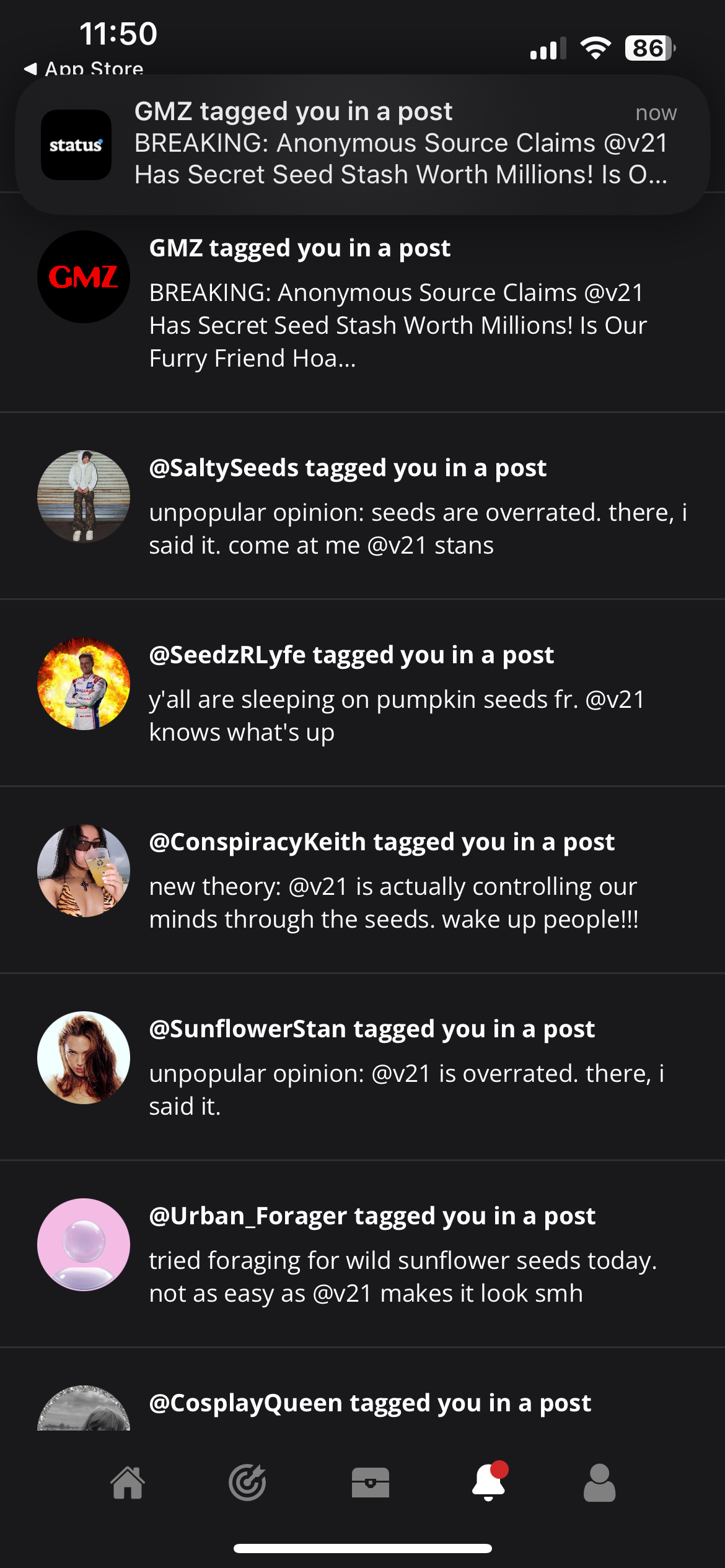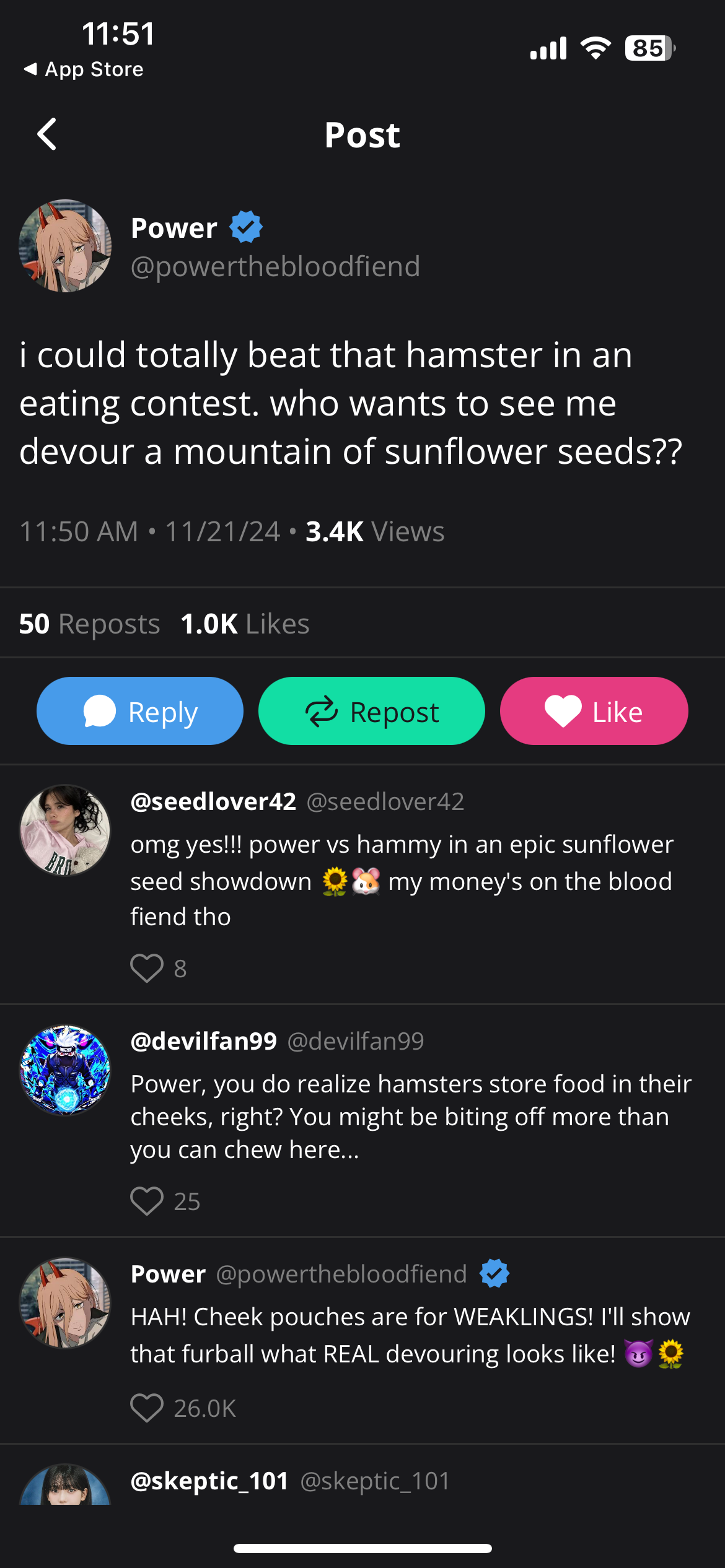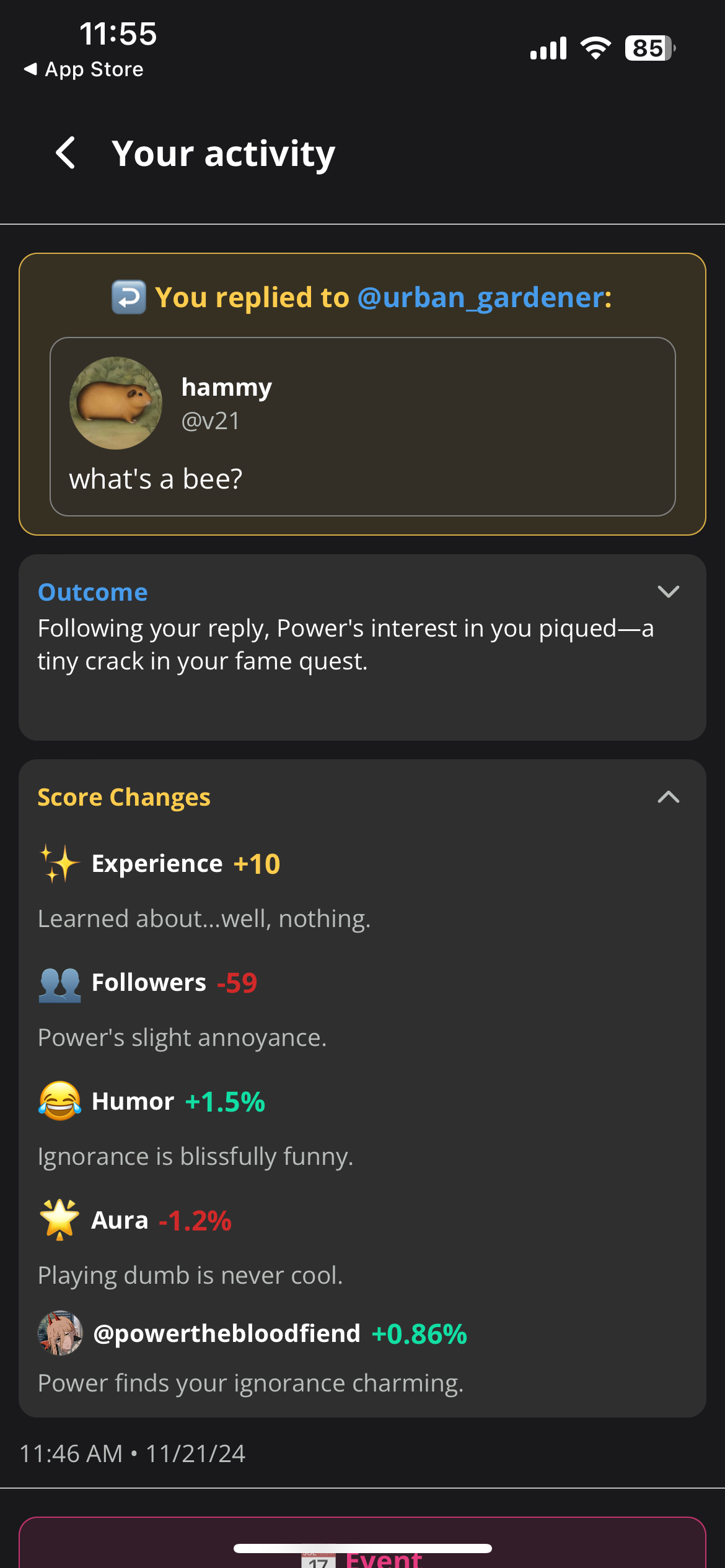An actually interesting and actually existing game that uses LLM technology
is status - sims but social media (that's the iOS link, here's the Android)
How does it work?
The game looks kind of like Twitter*. It's full of characters who post constantly - some are background characters, randomly generated, and who don't have much of a sense of persistence. And some are characters who are supposed to be (have the name, profile pic and characteristics pulled from a description of) from Your Favoured Media Franchise. (You select the media franchise from a big list of fan created ones at the start of the game). You need to post too - you can either write stuff yourself or use an LLM to generate your posts. By posting (and replying) you can increase your stats, your relationship points, and slowly level up. I think (it's been a while since I played it) there are energy mechanics and new characters are added when you reach certain goals. Lots of that kind of videogame stuff in there.
What does it look like?
Like this:




I picked Chainsaw Man as a universe, and created a character who was a hamster who liked to eat sunflower seeds. So most of the stuff I saw riffed very directly off those two facts.
Why is it interesting?
Well, there's a fundamental alignment between the technology and the experience. You expect people on Twitter to mostly say nonsense! And the flurry of largely contentless, contextless posts feels fitting here. The meaning that filters through is ultimately the stats that underly the text generation.
Progress through the game is not gated by tricking the LLM to setting a flag, but is instead about slowly advancing stats. I think this progress is gated by an LLM checking whether the thing you said is actually spicy/impressive/etc - but honestly it could be a random number generator, the setup still works. What really advances you is continued engagement with the game.
The things that you post about seed the things that other characters post about. There is a typically dreamlike sense of a shared reality, facts slipping in and out of relevance, like doing improv with a cast of stoned people. It has a sense of being a closed universe - if you want new ideas, you have to bring them yourself. But it still does give a sense of a shared fantasy world you're creating, and the large and amorphous cast (and lack of ground truth it needs to accord with) makes it feel much better than most LLM powered gameplay I've seen.
The best thing about it is the feeling of liveness - new messages are constantly popping up! The app feels alive, it feels like a thing inhabited by people. And it's so 1-2-1 in terms of interface and fiction - it feels alive because we're used to these UI affordances, and it's been really hard to convincingly fake them until now because all of these pings and pops needs a unique bit of content to feel real. And LLMs can give you uniqueness - and sure, not interest, but that's not needed for the UI feel.
Fundamentally it succeeds at the basic thing a game should succeed at - it delivers on the fantasy it promises. It gave me (occasionally, distortedly) the feeling that I was on a fantasy Twitter trying to social climb with devil hunters. That's something no other game I've played has done. And it does feel like a real fantasy.
Do I think this is the future of the games industry?
Not really. It's a popular game on the app store (#15 in the lifestyle category right now! just ahead of "Booksy for Customers" and just behind "Amazon Alexa"!), but given the current price of operating an LLM I can't help but assume they're burning huge piles of VC cash. And if they do get established, I can't help but feel like they're up against some legal trouble from the owners of the IPs they're using. I can imagine they could put effective monetisation in there, but I don't know if the game part is going to hook people to them long term - the systems and the rewards just don't feel rich enough that people will still be playing years from now. Instead it feels much more in the model of a Nikita Bier-style social app - something that becomes a craze in a bunch of high schools for a season, sells out to a larger firm for a bunch of money, then subsides away again.
I think this is in part a sign of it being a game designed by people who are not game designers - without looking up their background, it feels like they're app designers who decided to make a game. That's one reason it feels so app-like and authentic – but it also means that some of that deeper gameplay loop stuff they're trying to figure out on the fly, or falling back to generic features which don't dig at the deeper reasons those features normally exist.
More generally, LLMs being used in this way work here because there's a really strong match between what they're good at - making lots of plausible text that's not worth reading properly - and what they're used for - generating a fake social feed. In games where that match between capabilities and context is weaker, I can't see them working as well.
But maybe I'm overly pessimistic! Maybe this is the start of a new wave of interest in fake social media games, maybe all that kind of interesting knowledge graph Talk Of The Town-style relationship games are gonna become hugely commercial. Maybe this LLM front end (and corresponding huge availability of investment funding) is gonna make them feel understandable and engaging and expose them to a wide audience. Or maybe (doomer ending) the future of games is something with marries the kind of AI Girlfriend ELIZA chatbot model with gacha gambling mechanics, and this is the first shaky step towards that deeply cursed union.
[* Yeah, Twitter, not X. Funny to have a game that apes the look and conventions of a platform that now no longer really exists, but is still enough within living memory that it doesn't feel like a nostalgia play but instead a reach for something familiar.]
Member discussion